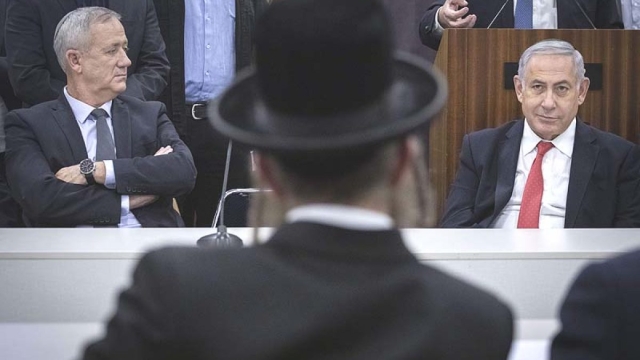In a highly charged political and spiritual atmosphere, Israeli Prime Minister Benjamin Netanyahu recently issued a stern caution against those contemplating travel to the Ukrainian city of Uman for the Rosh Hashanah celebrations. The warning, disseminated from his official office, sparked an explosive reaction from ultra-Orthodox circles. At the heart of this backlash was Netanyahu's statement, "God has not always protected us, not even in Europe and certainly not in Ukraine." To many in the ultra-Orthodox community, this was seen as a direct affront to their deeply held beliefs. Uman is renowned as the final resting place of Rabbi Nachman of Breslov, a legendary Hasidic Rabbi who passed away in 1810. Not only is he venerated by his immediate followers, the Breslov Hasidim, but also by a larger ultra-Orthodox population that perceives the pilgrimage to his tomb as profoundly spiritual.
Knesset Member Israel Eichler of the Degel Hatorah faction within the United Torah Judaism (UTJ) party launched a scathing attack on Netanyahu, labeling his comments as 'ignorant.' Eichler went on to assert that divine intervention, rather than Zionist enterprise, had been the bulwark against the Nazi invasion of the Land of Israel. In his view, it is God who has shielded Israel from harmful influences and the encroachments of secular assimilation, thus diminishing the role of Zionists. Eichler's stance is emblematic of a long-standing rift between Israel’s secular majority and an ultra-Orthodox minority that often espouses a non-Zionistic outlook.
PM Netanyahu to Uman pilgrims: "Israelis traveling to Ukraine need to bear personal responsibility at this time. G-d did not always protect us, not on European land and not on Ukrainian land." pic.twitter.com/nHnDJ2ZOGA
— Israel National News - Arutz Sheva (@ArutzSheva_En) September 10, 2023
Expanding on his critique, Eichler made some audacious claims: "The Zionists have long disconnected Jews in the diaspora. Members of the Judenrat collaborated with the Nazis during the Holocaust. Post-Holocaust, Jews around the world have lived in relative tranquility. Yet, in Israel, Jewish blood has been spilled ceaselessly." He pulled no punches in indicting past and current Israeli governments for perceived failures, notably in the Yom Kippur War. These views were countered vociferously from various quarters, both within Israel and globally. Opponents pointed to instances like the 1994 Buenos Aires Jewish center bombing and the Pittsburgh Tree of Life synagogue attack as evidence refuting Eichler's claims about safety outside Israel.
Interestingly, while the ultra-Orthodox argue that 'divine miracles' safeguarded the Jews in Palestine, they generally discount any miraculous role in Israel's establishment. On the other hand, many Zionists, both religious and secular, contend that divine intervention played a critical role in the UN vote that led to Israel's creation and in the subsequent military victories against multiple Arab armies. A noteworthy point is that, historically, the ultra-Orthodox have been largely exempt from serving in the Israel Defense Forces—a fact that has been a subject of political wrangling.
NO NO NACHMAN?
— Jewish News Syndicate (@JNS_org) September 11, 2023
Israeli pilgrims can now travel to Uman in Ukraine for Rosh Hashana but PM @netanyahu urges caution.
by @etgar_l https://t.co/a7S1dkGhRd
Adding another layer to this multifaceted debate, the Sephardic-dominated ultra-Orthodox Shas party also released a statement contradicting Netanyahu. They contended that God has consistently protected the Jewish people throughout history and credited Israel's resilience to adherence to faith, Torah, and mitzvot. Unlike their Ashkenazi counterparts, many followers of Shas and their late spiritual leader, Rabbi Ovadia Yosef, have served and continue to serve in the military.
Prominent voices from Netanyahu’s own coalition also joined the fray. Education Minister Yoav Kish vehemently denounced Eichler’s comments as 'anti-Zionist slurs.' Avigdor Lieberman, leader of the Israel Beitenu party, expressed his disdain for the ultra-Orthodox for their reliance on Israel's welfare system while not supporting the state. Even Yad Vashem, the World Holocaust Remembrance Center, issued a statement condemning Eichler's remarks and offered to host him for educational sessions on leadership in Holocaust history.
2/
— David W. Eisen (@IsraelTechLaw) September 11, 2023
asserted that the Holocaust incontrovertibly proved that the Zionists were correct & that the Ultra-Orthodox leadership, from which R. Soloveichik himself emerged, made grave errors.
For an excellent analysis of this controversial lecture see https://t.co/nFDf0NFWTn
[END]
This unfolding drama took place against a volatile backdrop—war-torn Ukraine. A budget of four million shekels was approved to assist Israeli pilgrims to Uman, as concerns arose about potential humanitarian crises at border crossings. Netanyahu's caution was bolstered by Minister Orit Struck, warning explicitly against travel to the embattled region.
Netanyahu remained unyielding, arguing that given the precarious conditions in Ukraine, it would be reckless to dismiss the associated risks. He cited a statement by Ukrainian President Zelensky about the inadequate local shelter facilities for the expected influx of pilgrims, thereby accentuating the gravity of the situation.
'God hasn't always shielded Jews in Europe, Ukraine' - Netanyahu. / His comments condemned by religious parties who threaten to leave the coalition and go with Benny Gantzhttps://t.co/C8mX40QAoE
— (((iAmAJudean))) 🇺🇦🇮🇱 (@TeachESL) September 11, 2023
This contentious debate transcends mere ideological clashes. It touches the very core of Israeli identity, national imperatives, and the role of faith in a land replete with historical and present-day complexities. Though both sides feel fortified in their beliefs, the avenue to resolution likely lies in continued dialogue and mutual understanding.


